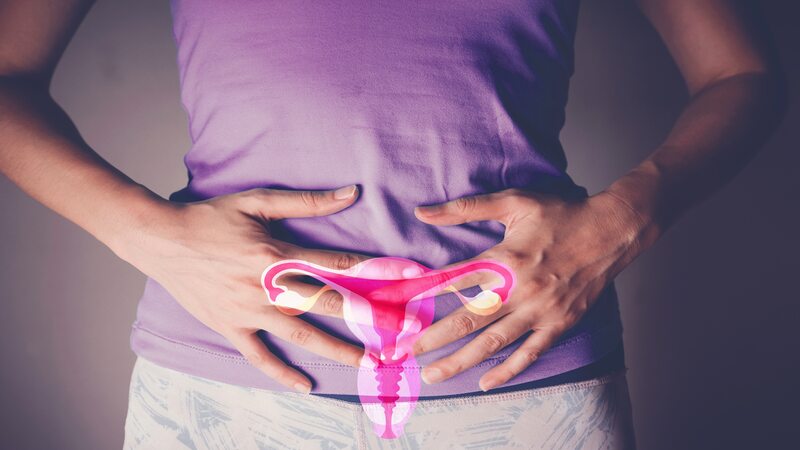
Hormones play an important role in determining a woman’s reproductive cycle. Right from menarche to menopause, a woman undergoes various fluctuations in her reproductive hormones. Menarche is the beginning of menses in a girl, while menopause means an end to her menstrual cycle. Before menopause, there is a transitional phase known as Perimenopause. This phase brings about significant hormonal changes affecting her health, including fertility.
This phase brings about a decline in fertility. Though, pregnancy can happen in the Perimenopause phase. Understanding the interplay between fertility and Perimenopause is essential for a woman going through this phase. With effective management, going through this phase smoothly is quite possible.
What Is Perimenopause?
Perimenopause, also known as the “Menopause Transition,” is the time period during which the female body makes the transition to menopause [1]. During this period, the body undergoes many changes, transitioning from reproductive to non-reproductive years [2]. The fluctuating hormone levels lead to irregularities in menstrual cycles. It can last up to many years before menstruation has ceased [3].
The main characteristics of Perimenopause are:
- Irregularities in the release of eggs.
- Less Fertile
- Decrease in estrogen synthesis [4].
- Shorter or irregular menstrual cycles
What Is The Difference Between Perimenopause And Menopause?
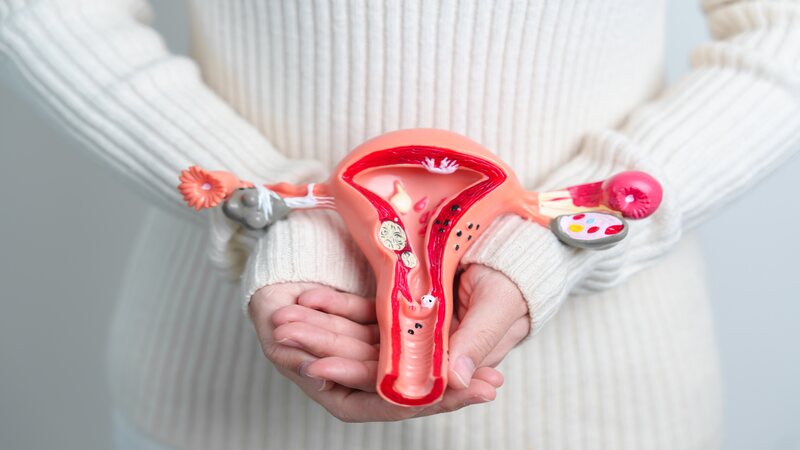
Both Perimenopause and menopause are closely related to each other. The basic difference is in the timing and characteristics. The differences in timing are:
- Perimenopause is the period leading to menopause. Generally, it starts in a woman’s 40s, or in some cases, a bit earlier [5].
- Menopause is officially diagnosed as when a woman stops having her periods for 12 consecutive months [6]. Typically, as per ACOG, the average age to attain menopause is 51 years [7].
The differences in the hormone levels are:
- In Perimenopause, there are fluctuating levels of hormones, leading to menstrual cycle irregularities [8].
- In menopause, there is a significant fall in the levels of estrogen and progesterone hormones [9].
Symptoms of Perimenopause

The symptoms of Perimenopause vary from woman to woman. The symptoms occur due to a decline in the estrogen and progesterone levels. Some women do not face many symptoms, while in some females the symptoms are more pronounced.
The typical symptoms of Perimenopause are:
- Irregular menstrual cycles. There are marked changes in the menstrual flow, the length of cycles and the frequency.
- Hot flashes are common when a woman feels sudden, intense heat along with excessive sweating [10].
- Night sweats that often disrupt sleep.
- Mood swings due to emotional imbalance. There can be phases of irritation, anxiety and depression [11].
- Vaginal dryness causes discomfort during sexual intercourse [12].
- Low libido or sexual drive.
- Brain fogging or trouble concentrating on things [13].
- Short-term memory issues.
- Weight gain.
- Thinning of hair and dryness of skin [14].
- Urinary incontinence, most often stress incontinence [15].
Is It Possible to Get Pregnant During Perimenopause?
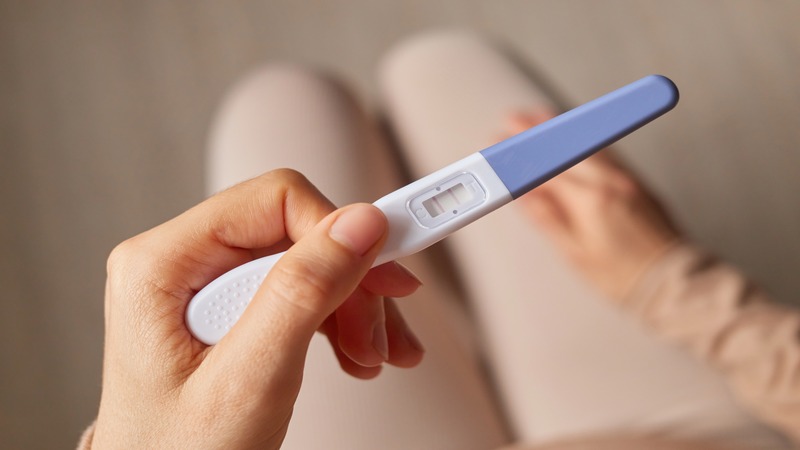
Yes, it is possible to conceive during Perimenopause [16]. Although the chances are quite low, it may take a long time if one is trying to get pregnant. Fertility in women decreases every year due to hormonal changes and irregular periods. A woman can conceive during this period due to occasional chances of ovulation. Typically, it depends on how near the woman is to her menopause. Closer to menopause, ovulation does not happen frequently, or if it does, the eggs are not of great quality [17]. Also, the hormones required to support a pregnancy are at optimum levels. All the above reasons make getting pregnant a bit difficult during Perimenopause.
In short, as long as periods occur in a woman, the potential to conceive is always there.
How Can I Tell If I’m Pregnant During Perimenopause?
The symptoms of pregnancy and Perimenopause often overlap, leading to difficulty in distinguishing between both. Signs and symptoms like missed periods, bloating, abdominal cramps, fatigue, mood swings, insomnia, and increase in urination are common to both.
The best way to confirm this is by taking a home pregnancy test. If the test comes back positive, or you feel any worsening in the above signs and symptoms, then it is best to see your healthcare provider for further evaluation.
Are There Risks To Getting Pregnant During Perimenopause?
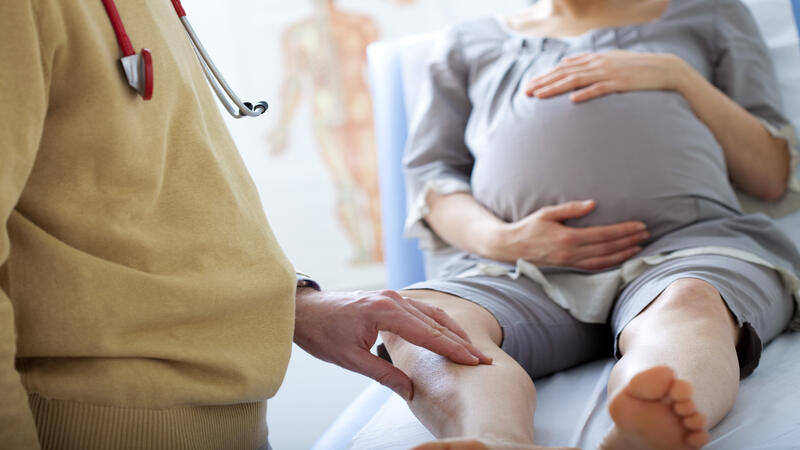
There can be certain complications that can arise due to getting pregnant during the Perimenopause phase. Some of the risks are:
1. Risk of Miscarriages
As the egg quality deteriorates with age, there are greater chances of miscarriage [18]. Also, there are higher chances of chromosomal abnormalities leading to miscarriages.
2. Risk of Abnormal Medical Conditions
Advanced maternal age in the Perimenopause period can often lead to hypertension, gestational diabetes and preeclampsia [19]. These issues can complicate any pregnancy.
3. Risk of Genetic Disorders
Women who get pregnant at an advanced age are more prone to giving birth to babies with genetic anomalies like Down Syndrome [20].
4. Complications In The Baby
Babies born to older women are at higher risk of being born preterm with a low birth weight [21].
5. Difficulties During Labor and Delivery
There is a higher risk of complications during labor for older women. This may justify the need for a cesarean section.
Hence, it is always better to consult your doctor if you are planning a pregnancy during your perimenopausal period. This will help in managing the pregnancy more vigilantly.
Common Myths And Facts About Perimenopause
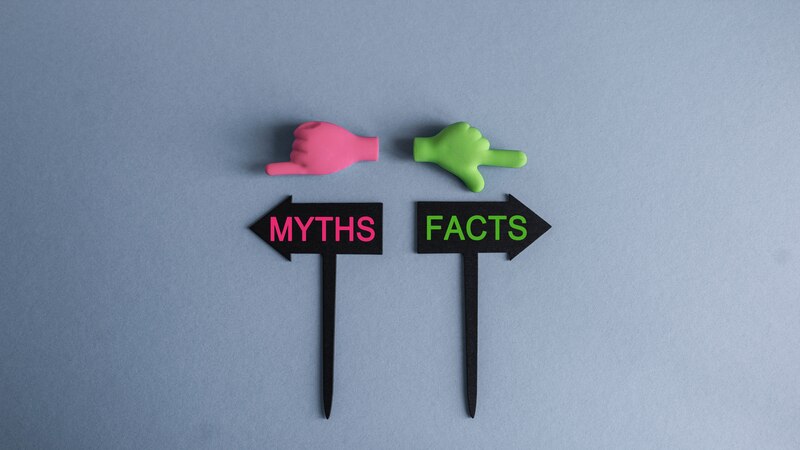
There are a lot of misconceptions about Perimenopause and menopause. Knowing the facts about Perimenopause is crucial, as it affects the well-being of a woman. Identifying the facts and bursting all the myths about Perimenopause can help navigate this phase smoothly and more effectively.
Some of the common myths are:
| Myths | Facts |
| The chances of getting pregnant during the Perimenopausal phase are so low that you don’t need birth control. | With age, the chances of conceiving become quite low, but it is still possible to get pregnant unless you have gone 12 months without getting periods. Hence, it is always better to consult your doctor about which birth contraceptive will work best for you. |
| Hot flashes always mean Perimenopause | Though hot flashes are quite common, they can occur in other conditions too [22]. Several other symptoms, like irregular cycles, mood swings, and sleep disturbances, also point towards Perimenopause. |
| Perimenopause can happen overnight in some women | Perimenopause can last for several years in many women. It is a gradual transition to menopause and generally starts in a woman’s 40s [23]. |
| Perimenopause is the same as menopause | Perimenopause and menopause are different from each other. Perimenopause is the period around menopause. It is a transitional phase leading up to menopause. Menopause means being period-free for 12 consecutive months. |
| Perimenopause only occurs in older women | The usual age of Perimenopause is around a woman’s 40s. Though, for some women, it can begin earlier. |
| Hormone Replacement Therapy is not beneficial in Perimenopause | Hormone Replacement Therapy helps a lot of Perimenopausal women struggling with bothersome symptoms [24]. It might not suit some women, so it is always better to discuss with your doctor, which form of hormone replacement will benefit you. |
To conclude, Perimenopause signifies a shift in a woman’s fertility. Although, it does not eliminate the possibility of getting pregnant entirely. Contraception must be considered for women who don’t want an unwanted pregnancy. If you have any concerns about this transitional phase, don’t feel shy to talk to your healthcare provider.
FAQ’s
1. How Likely Is Pregnancy During Perimenopause?
Pregnancy during Perimenopause is quite possible. Although, getting pregnant can be a bit difficult during this transitional phase due to irregularities in the menstrual cycle and ovulation. A decline in the hormonal level is also one of the reasons that getting pregnant becomes a bit difficult in the Perimenopausal period.
2. Can Perimenopause Feel Like Pregnancy?
Yes, the symptoms a woman has during the Perimenopausal period are quite similar to those one feels during pregnancy. The overlapping symptoms in both of them are missed periods, fatigue, mood swings and breast tenderness.
3. How Do I Know If I’m Perimenopausal?
Recognizing certain signs and symptoms can help determine whether a woman is in the Perimenopausal phase. The common indicators are irregular periods, mood swings, hot flashes, night sweats, sleep disturbances, vaginal dryness and increase in urinary frequency. You need to consult your doctor about these symptoms and effective management.
4. What Is The Average Age For Perimenopause?
The average age of Perimenopause is when a woman is in her 40s, typically around 45-50 years. Though it varies from woman to woman, some happen to attain Perimenopause earlier than the average age. This transitional phase can last for several years before a woman reaches menopause.
References
- Nanette Santoro, MDDepartment of Obstetrics and GynecologyUniversity of Colorado School of Medicine – https://www.liebertpub.com/doi/abs/10.1089/jwh.2015.5556
- Santoro N. Perimenopause: From Research to Practice. J Womens Health – https://www.ncbi.nlm.nih.gov/pmc/articles/PMC4834516/
- Delamater L, Santoro N. Management of the Perimenopause. Clin Obstet Gynecol – https://www.ncbi.nlm.nih.gov/pmc/articles/PMC6082400/
- Cleveland Clinic , Low Estrogen – https://my.clevelandclinic.org/health/diseases/22354-low-estrogen#symptoms-and-causes
- Mount Sinai, Menopause – https://www.mountsinai.org/health-library/report/menopause#
- Mayo Clinic, Menopause – https://www.mayoclinic.org/diseases-conditions/menopause/symptoms-causes/syc-20353397#
- Dr. Cynthia Abraham , American College of Obstetricians and Gynecologists – https://www.acog.org/womens-health/experts-and-stories/the-latest/an-ob-gyns-top-tips-for-managing-hot-flashes#
- Paramsothy, P., Harlow, S. D., Greendale, G. A., Gold, E. B., Crawford, S. L., Elliott, M. R., Lisabeth, L. D., & Randolph, J. F. (2014). Bleeding patterns during the menopausal transition in the multi-ethnic Study of Women’s Health Across the Nation (SWAN): a prospective cohort study – https://www.elektrahealth.com/symptoms/irregular-periods/
- Johns Hopkins Medicine, Introduction to Menopause – https://www.hopkinsmedicine.org/health/conditions-and-diseases/introduction-to-menopause#
- Written by Lori M. King, PhD, Medically Reviewed by Zilpah Sheikh, MD – https://www.webmd.com/menopause/menopause-hot-flashes
- American College of Obstetricians and Gynecologists, Mood Changes During Perimenopause – https://www.acog.org/womens-health/experts-and-stories/the-latest/mood-changes-during-perimenopause-are-real-heres-what-to-know
- American College of Obstetricians and Gynecologists, Vaginal Dryness – https://www.acog.org/womens-health/experts-and-stories/the-latest/experiencing-vaginal-dryness-heres-what-you-need-to-know#
- The Menopause Charity, Brain fog – https://www.themenopausecharity.org/2021/10/21/brain-fog/#
- Balance by Newson health -Dry, brittle hair and the menopause – https://www.balance-menopause.com/menopause-library/dry-brittle-hair-and-the-menopause/
- The menopause Society – Sexual Health – https://www.menopause.org/for-women/sexual-health-menopause-online/causes-of-sexual-problems/urinary-incontinence#
- Maureen K. Baldwin, Jeffrey T. Jensen, Contraception during the perimenopause,Maturitas,Volume 76, Issue 3,2013,Pages 235-242, ISSN 0378-5122 – https://www.sciencedirect.com/science/article/abs/pii/S0378512213002272
- Viera Fertility – Common Reasons Why You Aren’t Ovulating – https://www.vierafertility.com/blog/reasons-for-not-ovulating/
- Extend Fertility – https://extendfertility.com/your-fertility-3/egg-quality/#
- Sun M, Luo M, Wang T, Wei J, Zhang S, Shu J, Zhong T, Liu Y, Chen Q, Zhu P, Qin J. Effect of the interaction between advanced maternal age and pre-pregnancy BMI on pre-eclampsia and GDM in Central China. – https://www.ncbi.nlm.nih.gov/pmc/articles/PMC10124205/
- The Children’s Hospital of Philadelphia – https://www.chop.edu/conditions-diseases/pregnancy-over-age-30#
- Goisis A, Remes H, Barclay K, Martikainen P, Myrskylä M. Advanced Maternal Age and the Risk of Low Birth Weight and Preterm Delivery: a Within-Family Analysis Using Finnish Population Registers – https://www.ncbi.nlm.nih.gov/pmc/articles/PMC5860004/#
- Mayo Clinic – Hot Flashes – https://www.mayoclinic.org/diseases-conditions/hot-flashes/symptoms-causes/syc-20352790
- Iyer TK, Fiffick AN, Batur P. Nonhormone therapies for vasomotor symptom management (https://pubmed.ncbi.nlm.nih.gov/38561208/). Cleve Clin J Med. 2024;91(4):237-244. – https://my.clevelandclinic.org/health/diseases/21841-menopause
- Garnet Anderson, PhD, director, public health sciences division, Fred Hutchinson Cancer Research Center, Seattle. – https://www.webmd.com/menopause/menopause-hormone-therapy

